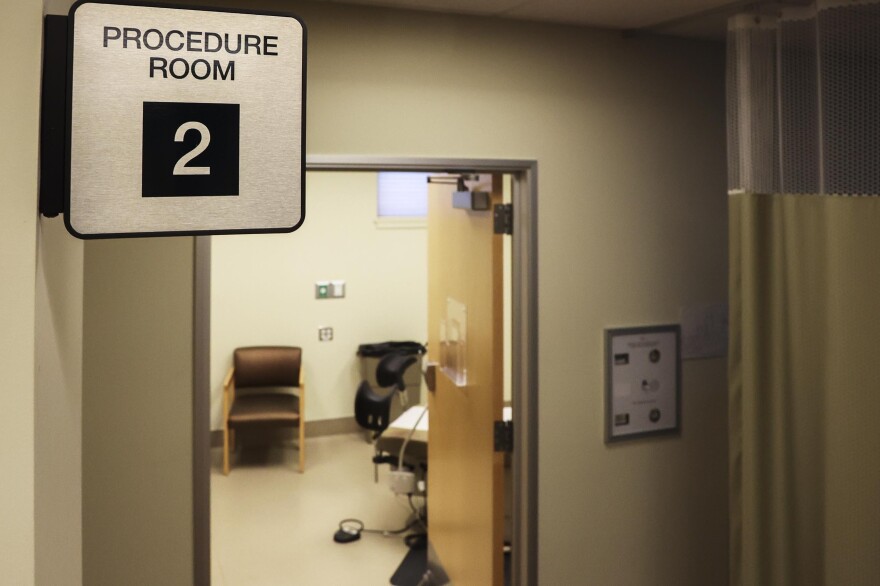Updated March 24, 2022 at 11:05 AM ET
A patient who gets an abortion – or the person who impregnated her and specific members of their family – could sue abortion providers in Idaho for tens of thousands of dollars in damages, under a new law signed by Gov. Brad Little on Wednesday.
The law, which bans most abortions after about six weeks of pregnancy, is modeled after a similar Texas law, SB 8, which allows anyone to bring lawsuits against health care providers, or anyone else, accused of helping provide such abortions.
"Unfortunately we don't even have to guess about what this will look like, because we've been watching what's been happening in Texas, so we already know what this looks like," says Mistie Delli Carpini-Tolman, Idaho State Director for Planned Parenthood.
Delli Carpini-Tolman notes that in the month after the Texas law took effect in September, the number of abortions reported in Texas fell by 60%, prompting many patients to travel out of state.
The Idaho legislation, known as SB 1309, narrows the field of potential plaintiffs to biological relatives, defined as a "female upon whom an abortion has been attempted or performed, the father of the preborn child, a grandparent of the preborn child, a sibling of the preborn child, or an aunt or uncle of the preborn child." Penalties for abortion providers start at $20,000 per violation.
Shaakirrah Sanders, a law professor at the University of Idaho, says that provision could provoke lawsuits that would quickly make it impossible for healthcare providers to continue offering the procedure.
"If there are 10 siblings and parents, all of those people can sue you, and they can all get $20,000," Sanders says. "You can see how one lawsuit could pretty much wipe out an entire clinic."
Unlike the Texas law, Idaho's ban allows abortions for pregnancies resulting from rape or incest — if the assault is reported to law enforcement. According to the anti-sexual violence group known as RAINN (Rape, Abuse & Incest National Network), more than two-thirds of victims do not report their assaults for a variety of reasons, including fear of retaliation or a belief that police would not help them if they did.
SB 1309 specifies that anyone who causes a pregnancy by committing rape or incest is not eligible to sue, though it's silent on how that person's guilt would be proven. And it includes no such exclusion for a rapist's family members.
In a letter to Idaho's Senate President about the law, Gov. Little expressed some reservations about the use of lawsuits for enforcement. Little expressed support for the abortion ban itself but said, "I fear the novel civil enforcement mechanism will in short order be proven both unconstitutional and unwise." He raised concerns that the same technique could be applied to other issues, such as religious freedom or gun rights, adding that, "none of the rights we treasure are off limits."
Little also expressed "significant concerns" about the potential impact on rape and incest victims, noting that many victims may lack the ability or support needed to report their assaults, and asked the state legislature to take unspecified steps to address those concerns.
Asked about those provisions, Carol Tobias, President of the National Right to Life Committee, says she believes such a policy would help to deter abortions.
"I think we need to do everything possible to save lives," she says. "And we would encourage anybody to take steps necessary to protect that life."
Tobias says she believes abortion is always wrong, and that rape victims should carry their pregnancies to term. Her group has been promoting similar state legislation around the country.
The unique enforcement mechanism first tried by Texas, which relies on ordinary citizens filing lawsuits, has succeeded where similar efforts to ban abortion have failed. Several states have passed laws in recent years banning the procedure in the first two months of pregnancy, only to see them blocked by courts. SB 8's novel legal strategy so far has sustained a series of state and federal court challenges, and the U.S. Supreme Court has refused to strike it down.
Taking cues from that success, Republicans in several states have proposed similar legislation; Idaho is the first to pass it.
During legislative debate this week, Republican state Rep. Steven Harris, who co-sponsored the bill in the Idaho House, praised the Texas law for stopping abortions "in their tracks. In the ensuing months, babies have been saved."
The move comes as state legislatures around the country are gearing up for a Supreme Court decision expected this summer that could overturn, or dramatically erode, Roe v. Wade and other precedents guaranteeing abortion rights. At the center of that case is a Mississippi law banning most abortions after 15 weeks of pregnancy.
Meanwhile, similar proposals are advancing in states including Tennessee and Oklahoma. Missouri lawmakers are considering legislation that would use a similar enforcement mechanism to try to prevent residents from leaving the state for an abortion.
Florida recently passed a 15-week ban, sending it to the desk of Republican Gov. Ron DeSantis.
Providers in neighboring states report that the onslaught of patients traveling from Texas has put pressure on their clinics, making it more difficult for local patients to get appointments.
"I think that with these laws going into effect, we're going to start to see ripple effects," says Jessica Arons, senior policy counsel at the American Civil Liberties Union. "You're going to see more and more patients displaced and having to travel even further to obtain care."
Barring a successful legal challenge, the Idaho law is set to take effect in 30 days. Reproductive rights groups say they're weighing their next steps.
Copyright 2022 NPR. To see more, visit https://www.npr.org.



